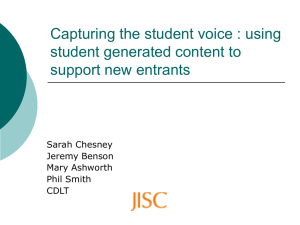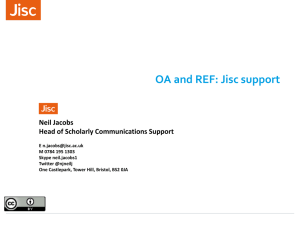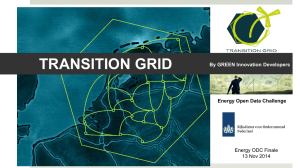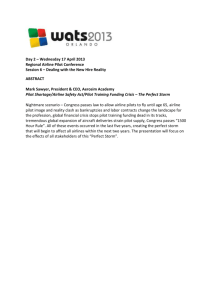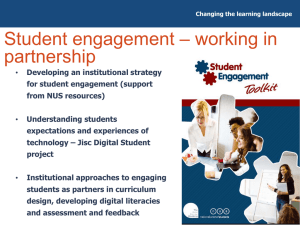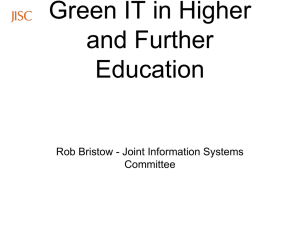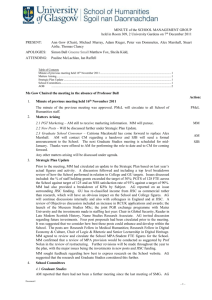comprehensive briefing document
advertisement
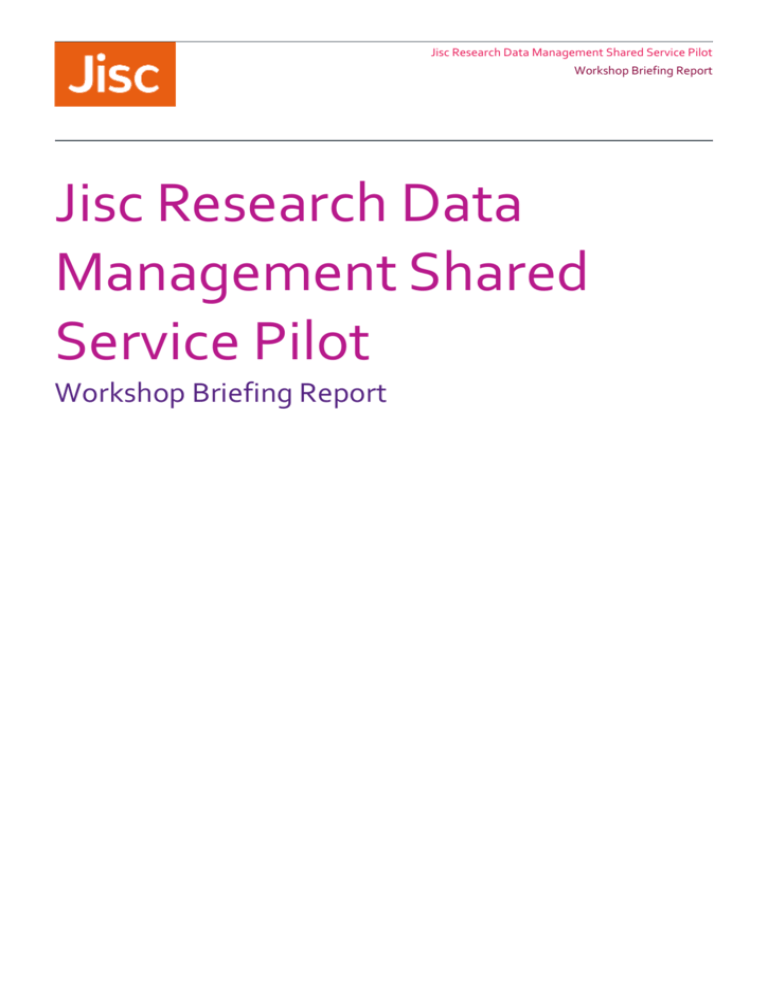
Jisc Research Data Management Shared Service Pilot Workshop Briefing Report Jisc Research Data Management Shared Service Pilot Workshop Briefing Report Jisc Research Data Management Shared Service Pilot Workshop Briefing Report Contents 1. Introduction ........................................................................................................... 1 2. RDM Systems Architecture .................................................................................... 3 3. Initial Requirements ............................................................................................... 8 4. Initial Service Concepts and Workflows .................................................................. 9 5. Pilot HEI Engagement .......................................................................................... 16 6. Procurement of Suppliers ..................................................................................... 21 7. Development Process and Timeline ...................................................................... 26 Contents Jisc Research Data Management Shared Service Pilot Workshop Briefing Report 1. Introduction The aim of the Research Data Management (RDM) Shared Service is to design and procure a Jisc hosted pilot service that can be taken up by higher education institutions to enable their researchers to easily deposit data for publication, discovery, safe storage and long term archiving. As part of the open research data agenda, research funders have started to mandate that the research data is made accessible. In order to comply with funders, institutions need to provide services and support to researchers throughout the research data lifecycle. The RDM Shared Service will explicitly address the local, institutional, requirements of the manage store and preserve, share and publish, and discover, reuse and cite areas of the research data lifecycle. The first iteration of the service will not provide support for ‘live’ active data, but will allow institutions to share a Jisc hosted and managed system that will allow them to meet their policy requirements for finalised research data objects that are ready for publication or archiving. This pilot service will create a user friendly research data ingest and publication platform on top of a data repository and middleware backed by safe storage located within the European Economic Area and enable long term archiving of research data. This project will need to deliver an interoperable solution that easily links to researcher and institutional active data storage, institutional research information management systems and national and international scholarly communications systems. There are a number of existing commercial and open source services that fulfil requirements for parts of the services needed to meet funder mandates and best practice, however the procurement and development of all the necessary components for a complete internal RDM solution can be resource intensive for institutions to piece together. This fragmented market and the varying approaches of institutions can lead to systems with gaps in functionality or institutions with no RDM systems at all. A Jisc procured and hosted system would relieve institutions of this procurement and management burden and would create large financial efficiencies in the sector, as well as enabling best practice in RDM and meeting the funder mandates. Jisc are looking to build a team of system suppliers and developers to collaborate with a number of pilot Higher Education Institutions (HEI’s). The tender for the suppliers will be published in late November/Early December 2016 and Jisc are currently asking HEI’s for formal expressions of interest Benefits for HEI’s involved in the pilot include: Institution branded RDM solution (also support open access text/object publication) Support policy compliance (EPSRC, REF, OpenAIRE,) and best practice Institutional support to refine RDM requirements and implementation Focus on intuitive UI and ease of use for researchers Focus on interoperability between systems Extensible, open standards based approach Introduction 1 Jisc Research Data Management Shared Service Pilot Workshop Briefing Report Bit-storage archiving and data preservation New features from Jisc pilot services: Usage Statistics and metrics, UK Research Data Discovery Service Jisc manages system, relieving burden from institutional IT and procurement staff Comprehensive reporting on RDM Collaboration with other pilot HEI’s and the wider community. It is anticipated that suppliers and HEI’s will work to develop the system over 2016 leading to the production of a business case for a full production service in summer 2017. This document contains detailed information on the proposed shape and functionality of the service, how Jisc and system suppliers will work with Pilot HEI’s , the shape of the procurement and the development process and timelines. It is hoped that the community of HEI’s and suppliers will provide feedback on these proposals. Introduction 2 Jisc Research Data Management Shared Service Pilot Workshop Briefing Report 2.RDM Systems Architecture Over 2015 Jisc has consulted on an ‘Ideal RDM Systems Architecture’ This architecture is intended to be a decision making tool to help Jisc and Higher Education Institutions evaluate existing infrastructure, data and metadata flows and evaluate where institutions may have gaps or requirements that Jisc could assist with through providing RDM shared services. The architecture in Figure 2.1 has been based on the concepts developed by John Lewis from University of Sheffield and Stuart Lewis from University of Edinburgh and published in ‘Research Data Management Technical Infrastructure: A Review of Options for Development at the University of Sheffield’. 1 The architecture also underwent scrutiny and feedback at a Jisc workshop in Birmingham in July 20152 and Repository Fringe in August 20153. The architecture follows the ideal data and metadata flows from the researcher into the planning process and various institutional research systems, including data repositories and Current Research Information Systems out into national and international data centres and the international scholarly communications systems. It serves to highlight the importance of interoperability between research systems and services. Figure 2.2 shows the scope of the Jisc Pilot shared service within this architecture. It will focus on the institutional research data repository and it’s interoperability with institutional and external systems and services. The first phase of the pilot will not include provision for active ‘live’ data storage and will focus on a system that will allow the ingest, publication, long term storage and preservation of finalised data objects for publication or archiving. Figure 2.2 also shows other areas where Jisc is currently active in research and development or providing services and agreements. For example the Jisc Research at Risk (R@R) challenge area4 is supporting the development of an API for DMP Online and a UK Research Data Discovery Service that will aggregate datasets published by institutions and data centres. In the active data area Jisc has already brokered agreements with cloud services providers, created a dynamic purchasing system for file sync and share and operates a shared data centre 1 http://dx.doi.org/10.6084/m9.figshare.1202230 2 http://researchdata.jiscinvolve.org/wp/2015/07/30/makes-ideal-research-data-management- system/ 3 http://researchdata.jiscinvolve.org/wp/2015/08/20/reflections-rdm-session-repository-fringe2015/ 4 https://www.jisc.ac.uk/rd/projects/research-at-risk RDM Systems Architecture 3 Jisc Research Data Management Shared Service Pilot Workshop Briefing Report Figure 2.1: ‘Ideal RDM Systems Architecture’ RDM Systems Architecture 4 Jisc Research Data Management Shared Service Pilot Workshop Briefing Report Figure 2.2: ‘Scope of Jisc RDM Shared Service Pilot’ RDM Systems Architecture 5 Jisc Research Data Management Shared Service Pilot Workshop Briefing Report Where possible this project will join up with other services, policy, practice and standards that are being developed through the Jisc Research at Risk portfolio, such as being interoperable with and providing metadata to the UK Research Data Discovery Service, learning from the early results of the metrics and usage statistics work and integrating ORCID into the service. The pilot’s requirements are already being informed by Jisc’s funder policy guidance and by findings from Research Data Spring projects. A summary of the related projects in the research at risk portfolio can be seen in figure 2.3. RDM Systems Architecture 6 Jisc Research Data Management Shared Service Pilot Workshop Briefing Report Figure 2.3 Inputs from Research at Risk Portfolio RDM Systems Architecture 7 Jisc Research Data Management Shared Service Pilot Workshop Briefing Report 3. Initial Requirements This section outlines high-level requirements. More detailed initial requirements can be found in Annex 1: Initial Statement of Requirements 5 The service must enable researchers and institutions to meet funder requirements and expectations, such as the EPSRC research data policy5. The service should also enable institutions to efficiently provide funders with reporting information for Research Excellence Framework6 and EC’s OpenAIRE7. The service must meet and comply with relevant information security, legal and ethical standards. The service must provide researchers with user-friendly methods to deposit, publish, share, discover, access and cite research data objects. The service must be able to store, archive, preserve and provide access to a range of research data objects from multiple disciplines and with differing file formats, sizes and volumes. The service must work towards interoperability and exchange of metadata with institutional systems, (CRIS, publication repositories etc.) and external systems and services (national data centres, scholarly communications services, UK Research Data Discovery Service). The service must use existing identity management, authorisation and access protocols and allow for different access policies for different types of data. https://www.epsrc.ac.uk/about/standards/researchdata/expectations/ 6 http://www.ref.ac.uk/ 7 https://guidelines.openaire.eu/en/latest/ Initial Requirements 8 Jisc Research Data Management Shared Service Pilot Workshop Briefing Report 4.Initial Service Concepts and Workflows The initial concept for the pilot shared service is that it should be developed in a layered, modular approach, as seen in figure 4.1. This approach has the advantage of being able to swap out different elements of the service in the future and offers the potential for further phases of the project to offer different layers as individual shared services for institutions who may not want the whole service. Figure 4.1 RDM Shared Service Pilot Layered Approach Figure 4.1 shows a user interface layer to enable user-friendly deposit, discovery, publication, sharing and citation. This user interface is built on top of repository software data and metadata exchange API’s to enable interoperability, archival management and storage. This is accompanied by a preservation layer, a suite of tools that will ensure that the data remains usable through its life as an archived object. The pilot’s UI will need to be modern and user friendly and not be a barrier to researchers in depositing data. The ingest form should automate metadata entry where possible. Conceptual wireframes of the type of ingest page and publication page UI can be seen in figures 4.2 and 4.3 Initial Service Concepts and Workflows 9 Jisc Research Data Management Shared Service Pilot Workshop Briefing Report Figure 4.2 Ingest UI Initial Service Concepts and Workflows 10 Jisc Research Data Management Shared Service Pilot Workshop Briefing Report Figure 4.3 Publication page UI Initial Service Concepts and Workflows 11 Jisc Research Data Management Shared Service Pilot Workshop Briefing Report Having the elements in place in these layers will enable the following workflows: Figure 4.4 Ingest Workflow Figure 4.2 shows the data and metadata flows to the elements of the service involved in the ingest process. In this workflow the researcher deposits data and metadata via the ingest UI into repository data storage and the metadata registry. There is an option for the institution to check the deposits for quality assurance. Once the data is approved a DOI is minted in compliance with policy and copies can go into archival and preservation systems. The dotted line shows the route for large datasets that need to be accessible (online repository storage) and those that can be stored offline on cheaper storage. In this case it would not be wise to carry out an upload via a web UI and an alternative transfer will need to take place using a different protocol. This scenario could also be used for sensitive data that needs to be deposited over a certain network into safe storage. Initial Service Concepts and Workflows 12 Jisc Research Data Management Shared Service Pilot Workshop Briefing Report Figure 4.5 Data Discovery/Download Workflow In this workflow the researcher has two ways to access the dataset landing page, where the data can be downloaded or requested. In these scenarios the researcher either follows the DOI URL in an article data access statement or carries out a search using the repository’s discovery UI which takes them to the Publication UI/Landing page. If the researcher wishes to download the dataset they can do that from that page if the data is freely available, or if the data is in offline storage or of a sensitive nature the researcher can initiate an archival storage access request for consideration. Initial Service Concepts and Workflows 13 Jisc Research Data Management Shared Service Pilot Workshop Briefing Report Figure 4.6 Data Archival/Preservation Workflow Figure 4.6 shows the basic workflow needed for preservation actions to occur. After the data and metadata are fed through the ingest UI preservation metadata around the file format, checksum, date deposited etc. will be automatically generated and stored in the data registry. This metadata will inform future preservation actions, file format identification and migrations etc. to be taken by tools from the preservation layer. In the meantime the dataset’s bits will be archived in two separate te locations in addition to the access, repository storage . Initial Service Concepts and Workflows 14 Jisc Research Data Management Shared Service Pilot Workshop Briefing Report Figure 4.7 Data and Metadata Interoperability Workflow Figure 4.7 shows the desired metadata flows to and from the repository from internal (blue) and external (orange) systems . These systems contain information about researchers, projects, related publications and data to allow for auto generation of metadata and to enhance reporting. A method of auto harvesting from local storage will also have to be developed for institutions who wish to migrate their data collections to this service. Initial Service Concepts and Workflows 15 Jisc Research Data Management Shared Service Pilot Workshop Briefing Report 5.Pilot HEI Engagement The participation process started in October with the invitation to send us an Informal Expression of Interest. This was to gauge the initial interest and to understand which institutions would be interested in the shared service. The information we gathered was very helpful in shaping the requirements and the initial design of the architecture. We are now seeking a formal expression of interest so that we can gather more details for the operational requirements which will feed into the tendering process. The following elements are considered in this section: 1. Expectations of pilot HEIs 2. Engagement with pilot HEIs 3. Expression of Interest (EOI) – informal and formal 4. Participation Criteria 5. Evaluation of EOIs 6. Notification of participation 1. Expectations of pilot HEIs In order for the shared service to be effective it is important for some key activities to take place, so please find below our expectations. Some of these will be requested as part at the Expression of Interest stage (marked EOI) but most of these will be met during the pilot. We will ask institutions to sign a statement that they have read and understood the expectations. The expectations are summarised here: i. Institutions will provide the name of an internal sponsor(s). This should be at the level of ProVice Chancellor of Research and/or Chief Information Officer. (EOI) ii. Institutions understand the scope and scale of the proposed RDM solutions. They will have read and understood the technical architecture and the operational requirements that form the tender document. iii. Institutions will work collaboratively with the third party suppliers to implement the shared solution and where necessary share information with Jisc and our partners on the institution’s architecture. Pilot HEI Engagement 16 Jisc Research Data Management Shared Service Pilot Workshop Briefing Report iv. Institutions will provide the inputs and resources needed to test the system. This will include access to researchers where domain expertise is necessary, the research data and the required metadata. v. Institutions will provide access to internal systems and the relevant technical staff for API development. vi. As part of the design and development of the service the institution will be required to create detailed institutional requirements during the discovery stage and give feedback into the development pathway. Technical support will be made available to do this. vii. HEIs will test the system to ensure that it complies with their institutional RDM policies. viii. Institutions will be asked to complete of a (light) Data Asset Framework (DAF) if they haven’t already undertaken one. This is in addition to the CARDIO quick quiz completed as part of the selection process. ix. Institutions will provide the resource and expertise to perform Quality Assurance exercises on ingested materials. x. Institutions will be expected to participate at events and on community forums to share practice and experience with the community. xi. Institutions will become part of a user-group of the pilot service. xii. Institutions will be expected to provide input to support a business case for a production level shared service. xiii. Institutions will communicate their experiences of being involved in service via blog posts and participation at workshops and events. xiv. Institutions will be engaged with the service development process and business case development from January 2016 to December 2017. Pilot HEI Engagement 17 Jisc Research Data Management Shared Service Pilot Workshop Briefing Report 2. Engagement with pilot HEIs Jisc are looking for a collaborative partnership with the pilot institutions as this shared service is a complex and extensive undertaking. To that end, we would like to engage pilot HEIs at each step of the process. We recognise that the expectations outlined above are extensive and we want to ensure that the pilot institutions are supported to work with us and our partners. One form of support will be to cover the costs of engagement such as travel and subsistence as well as the days of project engagement. We estimate this will be a minimum of £30,000 across the period of project engagement. We will be able to clarify the level of costs that will be covered as we move through the process of reviewing the EOIs and engaging the HEIs taking part. If you have any queries on this aspect we will be very happy to talk to you. In addition to a financial contribution towards costs we will offer the following support: Engagement with the proposed solution. We have released the draft requirements ahead of the procurement process to give institutions interested in taking part and the wider community the opportunity to give their feedback on the procured solution. The workshops on the 18th and 19th November are another opportunity for interested institutions to ask questions, gain clarification and help us refine the requirements so that the proposed solution meets their needs. Due to the requirements placed on Jisc with regard to the procurement process and the tight timelines it will not be possible to include institutions in the evaluation process. However, interested institutions will be able to give feedback on the published draft requirements by email and at the workshop, prior to finalising the tender. Selected pilot institutions will also be invited to provide feedback on the proposed solution as soon as the selection of suppliers has been made. If there are any reasons why a pilot institution cannot implement the selected solution(s) they will have the option to exit the pilot up to the end of the discovery phase at the start of the project. If this is the case, and it is feasible, Jisc may choose to engage a suitable alternative pilot institution. Technical and project support to the pilots. Jisc will commission a technical architect to work with each institution to understand their requirements and identify the integrations necessary with the proposed solution. The institutions will be invited to take part in a regular project calls where they can raise any technical issues with the project team. During the technical development the project team and the technical staff at the institution will be invited to take part in the stand-up meetings with the system developers. Jisc will also seek to provide resource for institutions that require assistance in producing a light-weight Data Asset Framework. Collaborative shared space for discussion, updates and sharing. Jisc will ensure that pilot institutions can effectively collaborate on the project, keep up to date, and share resources via an online platform. The RDM Shared Service people network. It is going to be very important to learn from each other, inform others and be aware of wider developments; we have been told by many HEIs that they would welcome this. Therefore around this RDM SS we will bring together a network of RDM practitioners and experts who share an interest in this success of the project and the experience of the pilots. Pilot HEI Engagement 18 Jisc Research Data Management Shared Service Pilot Workshop Briefing Report 3. Expression of Interest (EOI) – informal and formal Informal expressions of interest will be requested on a google form . This form is for institutions who are considering their involvement in the development of the service, expressing an interest as potential future testers or users or who would like to be kept up to date with the project. This information will be used by Jisc to gauge demand and to get view of the possible types of institution that will take part in the pilot. The form for informal expressions of interest can be accessed here: https://docs.google.com/forms/d/1vD4Wpw6RJtnbXlkfEB9qa5N4-npfoiXtME-WxHafz7g/viewform There will be a workshop held at Aston, Birmingham for institutions that are interested in the Jisc RDM Shared Solution on the 18th November. This is an opportunity for institutions to gain the clarification they require on the scale and scope of the pilot and the requirements that will form part of the procurement process. This workshop is now at capacity and institutions that are unable to attend can send queries by e-mail to the project manager John.Kaye@jisc.ac.uk. Formal expressions of interest will be requested using an extended version of the form used for the informal expression of interest, which must be submitted by close of business on 7nd December 2015. Institutions that have already submitted information at the informal stage will not be expected to repeat the information they have supplied previously. The form for formal expressions of interest can be accessed here: https://docs.google.com/forms/d/13d4ORBeZf05vD9oDweavmdh4rb3RA0Fa1X36Ex0SCm4/viewform 4. Evaluation of EOIs The pilot institutions will be evaluated against the information they provide on their formal Expression of Interest and on data that can be collected from publicly available sources. If there are more EOIs than can be accommodated in the pilot then selection will be based on achieving a balanced portfolio of different criteria across the pilot institutions. A balanced portfolio would cover the following elements: A. Type of institution o Jisc would like pilots to cover a range of institution types according to their particular focus B. Size of institution o The pilot institutions will be selected from a range of different sized institutions using FTE as a measure. C. Research Profile Pilot HEI Engagement 19 Jisc Research Data Management Shared Service Pilot Workshop Briefing Report o JIsc would like a range of institutions based on their research profile. The research profile will be considered in terms of research income and the breadth of research activity. All institutions should be able to demonstrate sufficient research activity to warrant the need for the RDM SS solution. D. Types of data o Jisc would like to test the service with a range of data types. In some cases one pilot could have a wide range of data types within their institution and in other cases a pilot could be chosen to provide data of a particular type. We would like to draw data from the fullest possible range of academic subjects: arts, humanities, social sciences and STEM. The pilot is limited to research data and publications. It will not include services created for administrative data or other content which the institution produces. E. Degree of RDM readiness o We would like engage institutions that cover a range of RDM readiness, from those that have no services currently in place to those that have some solutions but not a comprehensive or joined up service. Although some institutions may not have the technical solutions in place all institutions are expected to have taken steps towards understanding the particular RDM issues for their institution. F. Institutional systems o We would like to test the service against a range of institutional systems that administer or manage a range of functions: personnel; finance; administration; grant management; and research management. 5. Notification of Participation It is anticipated that institutions that have submitted a formal expression of interest will be notified of the result by e-mail in the week commencing 21st December 2015. Pilot HEI Engagement 20 Jisc Research Data Management Shared Service Pilot Workshop Briefing Report 6.Procurement of Suppliers Jisc wishes engage system suppliers and developers to develop a shared service to enable HEI’s to meet core UK funder policy compliance around research outputs, focused on research data, with the aim of providing a solution that integrates components to: ingest, store, publish, disseminate, preserve and report on finalised research objects. This service developed in this first stage of procurement will assess the benefits and business case for a future sustainable service for UK HEIs. Jisc envisages that the service will utilise and benefit from using open standards, in order to allow and encourage interoperability above that available in existing products. This part of the tender can include enhancements to existing products as well as the development of new tools where existing products do not exist. Jisc wishes to develop this service in partnership with a small number of pilot HEI’s and suppliers would be expected to work in collaboration with these institutions and respond to their requirements. The final product would include a user interface to be used by researchers to deposit, publish and discover data. It is expected that researchers from pilot HEI’s would be involved in scoping and designing their requirements for the user interface as well as being engaged in testing the interface. The overall tender is split into a number of lots that Jisc believe will work together, through the use of open standards, to provide a complete RDM Shared Service. Parts of the tender include the integration with existing research system and research information management components in use within institutions and in the wider research community. In addition, going forward, institutions may wish to provide their own solutions for one or more of the lots, perhaps to provide bespoke or unique features. Suppliers will be expected to provide adequate documentation and support services to support this flexible implementation. Jisc is looking for suppliers who can deliver a range of components of a research data service solution which are described in brief in the 6 draft Lots below. We would welcome bids from commercial providers, academic institutions, community groups or any other organisation with relevant skills and experience. Collaborative bids are also encouraged. Jisc is open to bespoke solutions, an existing open source / commercial solution or an integrated solution. Procurement of Suppliers 21 Jisc Research Data Management Shared Service Pilot Workshop Briefing Report Draft Procurement Lots Description of Research Data Shared Service Components Lot 1 Research Data Repository Development, Deployment, and Management A product that can record all research data ingested by institutions. The research data repository will take metadata from the ingest process and internal (institutional) and external research systems. The repository will be searchable and make metadata available for published objects. The repository will store discovery, administrative and preservation metadata and provide metadata to other systems using open standards. Lot 2 - User Interface Development of a front end to the research data repository from Lot 1 based on specification that will be defined by us from a requirements gathering activity. This UI will include functions for access and authentication, a data ingest form based on the metadata schema(s) supported by the repository, publication pages, a discovery (search) function, user workspace areas and an institutional administration area. Lot 3Metadata Exchange Interface To provide a solution using open standards to take metadata from a range of research systems, research information systems, planning tools and scholarly communication systems and integrate the data into the Research Data Repository. The interface will also provide metadata from the Research Data Repository to institutional and external systems such as CRIS systems and the UK Research Data Discovery Service Lot 4 Research Data Exchange Interface Provide a solution using open standards that allows for ingest and export of research data outside of the web interface. This would allow for ingest of large files, batches of files and data migration into and out of the service. Lot 5 Research Data Preservation To provide a suite of tools that enable archived objects to be usable over time. These include specifying and generating the necessary metadata, file format identification, file checking, transformation actions and emulation. Lot 6 – Research Data Reporting To provide a solution using open standards to generate reports on an institution’s research data, preferably using a dashboard approach. This will enable research managers to view the size, volume, usage, policy compliance and cost. This lot will also provide reporting data to funding bodies. Procurement of Suppliers 22 Jisc Research Data Management Shared Service Pilot Workshop Briefing Report This project may also be utilising existing Jisc agreements for consultancy, data storage and archiving. Existing Jisc Agreements Description of Research Data Shared Service Components Cloud Storage To provide commercial cloud storage for the service Infinity Data Centre To provide an option for local storage and hosting of software services Data Archiving Framework To provide long term archival storage of research data Futures Framework: to advise and support technical architecture To provide expert technical advice to the project; specifically on the technical architecture of the service, assessment of institutional systems and technical capability and to assist in gathering detailed requirements from institutions and researchers Futures Framework: To advise and support pre-development work To provide the consultation phase for stakeholders in the project, not focused on the final technology solution, for example an audit of datasets, legal and compliance framework. Futures Framework: RDM Co-ordination and implementation To facilitate collaboration between suppliers and HEI’s and monitor overall service development. This function will also gather evidence to feed into the business model for the next stage. Procurement of Suppliers 23 Jisc Research Data Management Shared Service Pilot Workshop Briefing Report Figure 6.1 Draft Procurement Lots Figure 6.1 shows the six draft procurement lots and the likely data and metadata flows between them. It is expected that data and metadata exchange between lots, products and solutions utilise open standards to encourage interoperability between systems. Procurement of Suppliers 24 Jisc Research Data Management Shared Service Pilot Workshop Briefing Report Timetable A Pre Qualification Questionnaire and Operational Requirements will be published shortly with a Notice to the European Journal. Activity Date Notice to European Journal November/December 2015 Selection of preferred supplier January/February 2016 Contracts placed by February/March 2016 The Research Data Shared Services project is initially funded for two years. The aim during this period is to develop a sustainable and flexible service that Jisc can move into a full production service. Continuity of services is key so it is envisaged that, should Jisc decide not to move to full production mode, the service components can instead be licensed directly to institutions or Jisc will arrange for migration of data and metadata into a system chosen by the institution. Jisc wishes to award contracts providing an initial 2 years of service with the possibility of extension for a further 2 years subject to requirements and performance review. Jisc cannot guarantee the level of expenditure through the framework agreement. Procurement of Suppliers 25 Jisc Research Data Management Shared Service Pilot Workshop Briefing Report 7.Development Process and Timeline Figure 7.1 outlines the service development process and figures 7.2 and 7.3 outline the proposed project timeline. Requirements gathering and refinement has already begun and the community will continue this process at the workshops. Committed Pilot HEI’s will be selected in December 2016 and will begin work with Jisc around their specific requirements in January 2016. In parallel suppliers for each lot will be selected and contracted to begin development on an alpha service with Jisc and the pilot HEI’s in spring 2016. It is proposed that the service will have a beta release in spring 2017 leading to a business case for a full production service in Summer 2017. There is an aspiration that future phases of this project will allow modules of this service to be released as ‘micro shared services’ to fill gaps in provision at institutions who may not desire or require an end to end product. Development Process and Timeline 26 Jisc Research Data Management Shared Service Pilot Workshop Briefing Report Figure 7.1 RDM Shared Service Pilot Development Process 27 Jisc Research Data Management Shared Service Pilot Workshop Briefing Report 28 Jisc Research Data Management Shared Service Pilot Workshop Briefing Report 29
